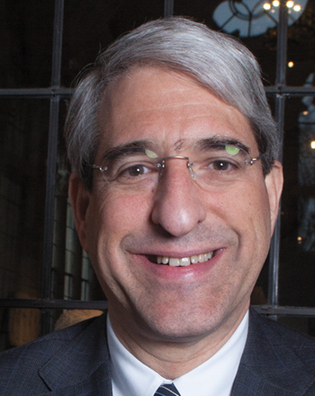 loading
loading
Q&A: Peter SaloveyComputer science gets an upgradeMore faculty and more space for a popular department. The Yale Alumni Magazine regularly holds a conversation with Yale president Peter Salovey ’86PhD to provide a forum in which alumni can learn his views. (Interviews are conducted both in person and by e-mail and condensed for print.) In this issue, Salovey answers questions about changes in the computer science department.  Mark OstowView full imageY: Students were agitating this spring about the state of the computer science department.S: The conversation reflected something fundamentally positive: there’s strong student interest in computer science. Our department is modest in size. It covers certain aspects of the field very well—for example, theory, which is the mathematical side of computer science—but there are parts of the field where we don’t have many faculty members. Some of our students, both majors and non-majors, are interested in the more applied side of computer science that links up with engineering—from how to design applications to robotics. They want the computer science department to grow in these and other directions. Y: Faculty were also raising their voices.S: The faculty recognized that in recent years they have been advising more students, and class size has grown. Moreover, the departments with which they compete for graduate students are often bigger than Yale’s—we are only around 20 faculty members. And so, at the end of March, we announced a plan for growth to help computer science continue to excite undergraduates, compete effectively for the best graduate students, and produce world-changing research. First, the faculty voted to make computer science a department of the School of Engineering and Applied Science. This provides engineering with greater scope and scale, bringing the school to a size typical in many universities, and it allows computer science and engineering to share resources and work together. Y: Is it usual for computer science to be part of an engineering school?S: There’s no single pattern, but it’s not unusual. The primary advantage is intellectual collaboration, but also, the school’s resources can now help support computer science. This reorganization has created a lot of excitement. Several alumni have now stepped forward to fund additional faculty positions so we can expand computer science by 30 percent. I view this as the initial phase in a longer-term plan to enhance and expand the department. But first, we want to make sure we can attract the very best faculty and address student needs, and that the integration of computer science and engineering goes well. The last piece of the plan is to create exciting and inspiring new teaching spaces for computer science and engineering. We envision a teaching concourse that will be underground between Watson—computer science’s home—and Dunham, an engineering building, and right next door to Becton, the location of the extremely successful Center for Engineering Innovation and Design. Y: Which came first, the student lobbying or this plan?S: I’m always happy to hear from students and listen carefully to their interests. In this case, students were lobbying for something that the university leadership and the computer science faculty were also discussing. We’ve been planning concretely over the past year, though the gifts to drive the plan arrived only recently. Y: Bloomberg says there are few Yalies in Silicon Valley.S: That simply is not correct. Computer science chair Joan Feigenbaum tells me she’s never met a Yale student in her 15 years here who wanted a Silicon Valley job who didn’t get one. The alumni network in tech is robust and growing. Moreover, we have tech entrepreneurs and leaders in the valley (for example, Ben Silbermann ’03 of Pinterest, Donna Dubinsky ’77 of Palm and Numenta, and Justin Kan ’05 and Emmett Shear ’05 of Twitch) and all over the world—for example, Joe Tsai ’86, ’90JD, at Alibaba in China, and Kevin Ryan ’85 in “Silicon Alley” in New York. Our students learn in a liberal arts environment, so they have more than just technical skills. Bing Gordon, a Silicon Valley executive and investor, has said, “Yale people are the best synthesizers and team builders of any selective university.” Our students learn how to communicate, think creatively, solve problems, and work collaboratively. Those skills, wedded with tech- nical knowledge, allow Yalies to thrive in Silicon Valley and around the world.
The comment period has expired.
|
|